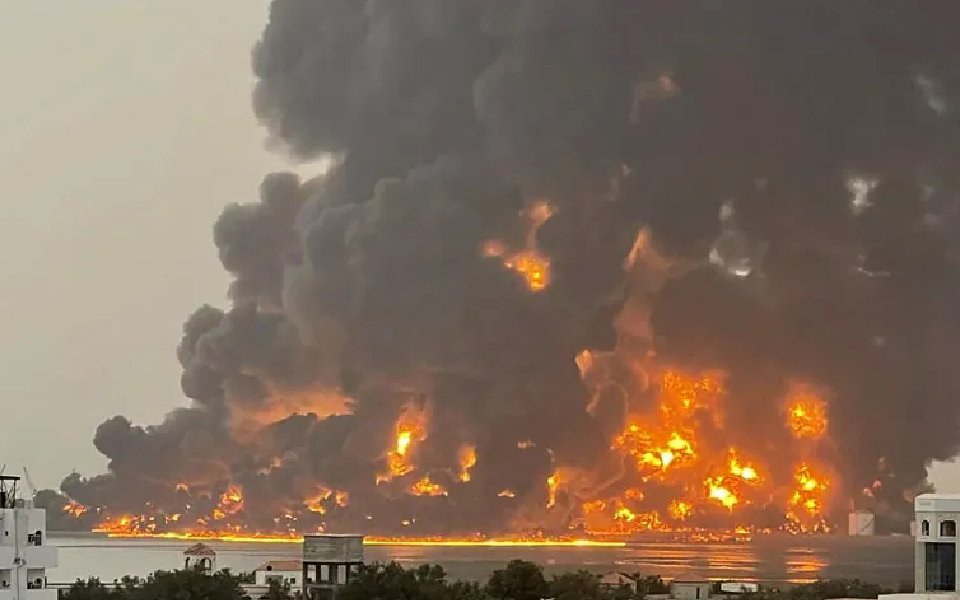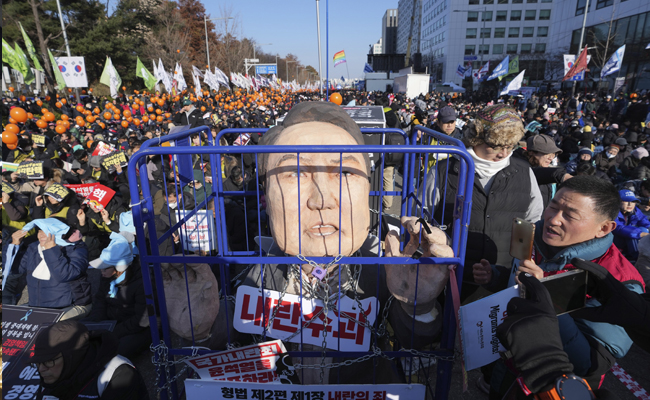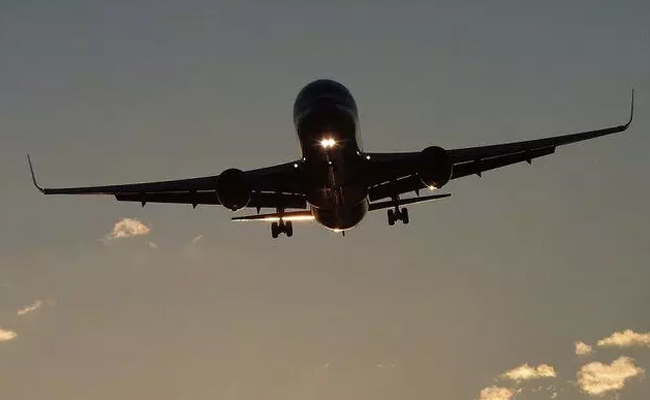Sanaa (Yemen), Jul 20: The Israeli army said on Saturday it has struck several Houthi targets in western Yemen following a fatal drone attack by the Houthi group in Tel Aviv the previous day. The Israeli strikes appeared to be the first on Yemeni soil since the Israel-Hamas war began in October.
A number of “military targets” were hit in the western port city of Hodeidah, a Houthi stronghold, the Israeli army said, adding that its attack was “in response to the hundreds of attacks carried out against the state of Israel in recent months”.
Houthi spokesman Mohammed Abdulsalam wrote on social media platform X that Yemen was subjected to a “blatant Israeli aggression” that targeted fuel storage facilities and the province's power station. He said the attacks aim “to increase the suffering of the people and to pressure Yemen to stop supporting Gaza”.
Abdulsalam said the attacks will only make the people of Yemen and its armed forces more determined to support Gaza. Mohamed Ali al-Houthi of the Supreme Political Council in Yemen wrote on X that "there will be impactful strikes”.
A media outlet controlled by Houthi rebels in Yemen, Al-Masirah TV, said the strikes on storage facilities for oil and diesel at the port and on the local electricity company caused deaths and injuries, and several people suffered severe burns. It said there was a large fire at the port and power cuts were widespread.
Health officials in Yemen said the strikes killed a number of people and injured others, but did not elaborate.
The drone attack by Houthi rebels killed one person in the centre of Tel Aviv and wounded at least 10 others near the United States Embassy early Friday.
Virtually all projectiles fired from the southern Arabian country toward Israel have so far been intercepted. Israel said air defences detected the drone on Friday but an “error” occurred and “there was no interception".
Since January, the US and British forces have been striking targets in Yemen, in response to the Houthis' attacks on commercial shipping that the rebels have described as retaliation for Israel's actions in the war in Gaza.
The joint force airstrikes have so far done little to deter the Iran-backed force.
Let the Truth be known. If you read VB and like VB, please be a VB Supporter and Help us deliver the Truth to one and all.
Seoul (AP): South Korea's impeached President Yoon Suk Yeol was detained in a massive law enforcement operation at the presidential compound Wednesday, defiantly insisting the anti-corruption agency didn't have the authority to investigate his actions but saying he complied to prevent violence.
In a video message recorded before he was escorted to the headquarters of the anti-corruption agency, Yoon lamented the “rule of law has completely collapsed in this country.”
Yoon, the country's first sitting president to be apprehended, had been holed up in the Hannam-dong residence in the capital, Seoul, for weeks while vowing to “fight to the end” the efforts to oust him. He has justified his declaration of martial law Dec. 3 as a legitimate act of governance against an “anti-state” opposition employing its legislative majority to thwart his agenda.
The Corruption Investigation Office for High-Ranking Officials said Yoon was brought into custody about five hours after investigators arrived at the presidential compound and about three hours after they successfully entered the residence, in their second attempt to detain him over his imposition of martial law.
A series of black SUVs, some equipped with sirens, were seen leaving the presidential compound with police escorts. Yoon was later seen stepping out of a vehicle after arriving at the agency's office in the nearby city of Gwacheon. Following the questioning, Yoon was expected to be sent to a detention centre in Uiwang, near Seoul.
What's next?
Yoon could be held in custody for weeks.
The anti-corruption agency, which is leading a joint investigation with the police and the military over whether Yoon's martial law declaration amounted to an attempted rebellion, has 48 hours to request a court order for a formal arrest on a charge of attempting a rebellion, and if it fails to do so, Yoon will be released. If Yoon is formally arrested, investigators can extend his detention to 20 days before transferring the case to public prosecutors for indictment.
Yoon's presidential powers were suspended when parliament impeached him on Dec. 14. The impeachment case now rests with the Constitutional Court, which could formally remove Yoon from office or reject the case and reinstate him.
The scene at the compound
As they began the detention operation in the early morning, the anti-corruption investigators and police officers engaged in an hourslong standoff at the compound's gate with presidential security forces but otherwise encountered no meaningful resistance.
Some police officers used ladders to climb over rows of buses placed by the presidential security service near the compound's entrance, and then the investigators began moving up the hilly compound.
The investigators and police later arrived in front of a metal gate with a gold presidential mark that's near Yoon's residential building. Some officers were seen entering a security door on the side of the metal gate, joined by one of Yoon's lawyers and his chief of staff. The presidential security service later removed a bus and other vehicles that had been parked tightly inside the gate as a barricade.
Despite a court warrant for Yoon's detention, the presidential security service had insisted it's obligated to protect the impeached president and fortified the compound with barbed wire and rows of buses blocking paths.
The preparations and the concerns
South Korea's acting leader, Deputy Prime Minister Choi Sang-mok, issued a statement early Wednesday urging law enforcement and the presidential security service to ensure there are no “physical clashes.”
Park Chan-dae, floor leader of the liberal opposition Democratic Party, which drove the legislative campaign that led to Yoon's impeachment on Dec. 14, said Yoon's detention is the “first step toward restoring constitutional order, democracy, and realizing the rule of law.”
As investigators moved up the hillside compound, lawmakers from Yoon's People Power Party held a rally in nearby streets, decrying the efforts to detain him as unlawful.
The National Police Agency met with field commanders in Seoul and nearby Gyeonggi province in recent days to plan their detainment efforts, and the size of those forces fueled speculation that more than a thousand officers could be deployed. The agency and police had openly warned that presidential bodyguards obstructing the execution of the warrant could be arrested.
Yoon's lawyers have claimed that the detainment warrant issued by the Seoul Western District Court was invalid. They cited a law that protects locations potentially linked to military secrets from search without the consent of the person in charge — which would be Yoon. They also claimed that the anti-corruption agency had no legal authority to investigate rebellion allegations.
“I am truly appalled to see illegalities upon illegalities upon illegalities being carried out and procedures being forcefully conducted under an invalid warrant,” Yoon said in the video released before his detention. “I do not acknowledge the investigation by the Corruption Investigation Office for High-Ranking Officials. As the president, who is responsible for upholding the constitution and legal system of the Republic of Korea, my decision to comply with such illegal and invalid procedures is not an acknowledgment of them, but rather a willingness to prevent unfortunate and bloody incidents.”
Yoon's supporters and critics have held competing protests near the residence — one side vowing to protect him, the other calling for his imprisonment — while thousands of police officers in yellow jackets closely monitored the tense situation.
What led to this
Yoon declared martial law and deployed troops around the National Assembly on Dec. 3. It lasted only hours before lawmakers managed to get through the blockade and vote to lift the measure. The opposition-led assembly voted to impeach him on rebellion charges Dec. 14.
The Constitutional Court held its first formal hearing in the impeachment case on Tuesday, but the session lasted less than five minutes because Yoon refused to attend. The next hearing is set for Thursday, and the court will then proceed with the trial whether or not Yoon is there.





